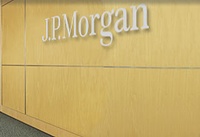JPMorgan seeks to settle regulatory probes for $11 bn: report
26 Sep 2013
US banking giant JPMorgan Chase & Co is in talks with several US state and federal agencies for a $11-billion settlement of regulatory investigations related to its handling of mortgage-backed securities in the years leading up to the 2008 financial crisis, official sources said on Wednesday.
 The proposed $11 billion settlement could include $7 billion in cash and $4 billion in relief for Americans who lost their homes or who owe more on their mortgages than their homes' worth, reports quoting sources close to the now unofficial negotiations said.
The proposed $11 billion settlement could include $7 billion in cash and $4 billion in relief for Americans who lost their homes or who owe more on their mortgages than their homes' worth, reports quoting sources close to the now unofficial negotiations said.
The sum, so far the largest offer in a regulatory probe settlement, however, looks paltry compared to the billions of dollars investors had lost on buying in those mortgage-backed securities.
JPMorgan has not agreed to the amount and the talks are ongoing with state and federal authorities, which includes the US Department of Justice (DoJ), the Securities and Exchange Commission SEC, the US Department of Housing and Urban Development and the New York State Attorney General, people close to the matter said.
The amount in discussion is bigger than the $3 billion British pharmaceutical giant GlaxoSmithKline agreed to pay to the DoJ in 2011 for selling some drugs for unapproved uses. (See: GSK to pay $3 bn to settle US investigations for promoting drugs for unapproved uses)
It is also higher than the $3 billion JPMorgan offered to pay to the DoJ on Tuesday to settle the investigations.
While JPMorgan overcame the worst losses in the financial crisis, the investment bank continued to lose money since May 2012, on derivatives bets that were known as the `London Whale' trades.
Those bets cost the bank more than $6.2 billion in pre-tax earnings and heightened problems of the bank's chief executive Jamie Dimon with regulators.
Faced with over a dozen investigations worldwide, including in the US, JPMorgan is now offering to pay up in the hope of easing some of the regulatory pressures.
Most of the investigations are related to billions of dollars in losses suffered by investors in sub-prime mortgage securities issued by Bear Sterns between 2006 and 2007.
The New York-based investment bank was rescued from a near-collapse through a take over by JPMorgan in 2008.
Bear Stearns allegedly defrauded investors by packaging and selling poor quality mortgage assets that it knew were likely to default.
Investors have so far suffered losses of around $22.5 billion on more than 100 subprime securities the company had issued.
The probe is the first action from the residential mortgage-backed securities (RMBS) taskforce, instituted by President Barack Obama in January 2012 to investigate and prosecute alleged frauds tied to mortgage securities that surfaced during the 2008 financial crisis.
It was formed amid widespread criticism over the government's inaction to hold offenders from the financial sector those were responsible for the financial crisis.
The New York attorney general has alleged that Bear Stearns led investors to believe that the mortgage securities in its portfolio had been carefully evaluated and would be continuously monitored.
Bear Stearns failed to do either, resulting in investors buying securities backed by mortgages that borrowers could not repay and defaulted in large numbers.
Mortgage-backed securities are financial products consisting of mortgages pooled together and repackaged and sold to investors as securities.
In the run up to the global financial crisis, sub-prime mortgages were sold to people with less credit and many of them defaulted on their loans when the property bubble burst.
This led to huge losses to banks and other financial institutions which became burdened with so-called ''toxic assets'' calling for bailouts.
In 2011, the US Federal Housing Finance Agency filed lawsuits against 17 of the world's top financial institutions including JPMorgan, saying they sold $196 billion of risky home loans to government sponsored mortgagers Fannie Mae and Freddie Mac without adequate scrutiny.
JPMorgan's involvement amounted $33 billion in the deals.
JPMorgan has been arguing that it is being hauled up for buying Bear Sterns at the behest of the Federal Reserve in order to help the government's efforts to save the economy.
The penalties agreed to by JPMorgan are manageable for it - it is the biggest bank in the US by assets, and reported a net income of $21.3 billion last year, with an even higher profit projected for the current year.
JPMorgan generates huge amounts of capital from its worldwide operations so as to spend $6 billion to buy back stock in the 12 months through next March, with regulatory approval.
The buyback, however, is conditional to the bank improving the way it calculates its capital needs.
The bank also spent about $5 billion a year on legal costs the past two years, relating to the London Whale trade bets and the scams related to mortgage loans and mortgage securities.
Regulators were also lax in tackling issues like risk and operational controls at the bank, as well as anti-money laundering and Bank Secrecy Act.
With total assets of $2.509 trillion, JPMorgan is ranked as the largest bank in the US by assets and the second largest bank globally in 2012.



















